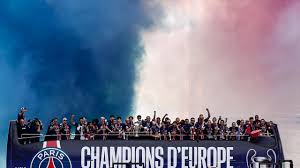29th October 2025

October 29 – Paris Saint-Germain have posted record revenue of €837 million ($976m) for the 2024-25 season, fuelled by the club’s historic Champions League triumph.
The results mark a €31 million increase on last year’s total (€806m) and cement PSG’s status as one of world football’s biggest commercial operations, ranking third in Deloitte’s Football Money League.
The club’s commercial revenue hit €367 million, driven by six new partnerships, while matchday income reached €175 million, supported by a sell-out streak of 170 consecutive home games.
This enthusiasm was met with perhaps the most dominant season ever in French football. PSG’s men’s team swept to an unprecedented season, lifting the Champions League, Ligue 1, French Cup, and Trophée des Champions, before finishing runners-up at the Club World Cup. The long-awaited European title delivered on Qatar Sports Investments’ (QSI) 14-year project since taking ownership in 2011.
Yet despite the record turnover, PSG again reported an undisclosed annual loss, following last year’s deficit of around €60 million. The club’s challenge remains structural: the relatively low broadcast income from Ligue 1 and a stadium capacity of 48,000 continue to limit long-term profitability.
That issue lies at the heart of PSG’s tension with Paris City Hall. The Parc des Princes remains owned by the city, and Mayor Anne Hidalgo has stood firm on her refusal to sell. “Our door is always open to expanding the Parc des Princes – not to sell, but to expand,” she told Le Parisien earlier this year.
Frustrated by the stalemate, PSG are now exploring alternative stadium sites in Passy and Massy, both outside Paris, with a final decision expected by autumn 2026. Any new ground would likely exceed 60,000 capacity, a critical step if PSG are to compete financially with the likes of Real Madrid and Manchester United, who lead global revenue charts at €6-7 billion valuations and billion euro revenues.
For now, PSG’s €837 million headline offers a powerful snapshot of success. But beneath the numbers lies a club still battling with the politics, property and the economics of French football.
Contact the writer of this story, Harry Ewing, at [moc.l1761749751labto1761749751ofdlr1761749751owedi1761749751sni@g1761749751niwe.1761749751yrrah1761749751](javascript:;)